Laptop Mag Verdict
The Asus ROG Flow X16 is a one-of-a-kind gaming laptop that looks set to redefine portable play with a convertible chassis and a gorgeous mini-LED display. If you look past the price tag, you will love this beast.
Pros
- +
Sleek, convertible form factor
- +
Drop dead gorgeous display
- +
Strong performance
- +
Stellar battery life
- +
Quiet fans
Cons
- -
Webcam = potato
- -
Heats up quickly under strenuous use
- -
Expensive, starting from $2,000
Why you can trust Laptop Mag
Price: from $2,000
CPU: AMD Ryzen 9 6900HS
GPU: Nvidia GeForce RTX 3060/RTX 3070 Ti
RAM: 16GB
Storage: 1TB SSD
Display: 16-inch, 1440p, 165Hz, touchscreen Mini LED
Battery: 7:05
Size: 14 x 9.6 x 0.8 inches
Weight: 4.63 pounds
The Asus ROG Flow X16 is what happens when a giant gaming laptop gets freaky with a convertible ultraportable — and the result is glorious.
With a beastly AMD Ryzen 6900HS CPU, up to an RTX 3070 Ti GPU and plenty of DDR5 RAM, a mini-LED display that is a treat for the eyes, and a 360-degree hinge that makes this rig a flexible hottie (shh, don’t tell my girlfriend), this is ticking all the right boxes.
But it does come with a hefty price tag. So why am I, someone who started as a deals writer because I love saving money, singing the praises of the costly X16? Let me explain.
Asus ROG Flow X16 price and configurations
Let’s get probably the most sizable sore spot out the way. The Asus ROG Flow X16 starts at $2,000 for the RTX 3060-packed system, and while the RTX 3070 Ti model that we also tested doesn’t have an official USD price just yet, the £2,799 asking price means you’re going to be spending the best part of three grand on it.
The mid-range option is $500 more than the Asus TUF Gaming F15, which packs similar power, and is the same price as the more powerful Asus ROG Zephyrus G15. As for that top-of-the-range choice, it looks set to be more expensive than the Alienware m17 R5. Oh, and both models are $200 more expensive than similarly-specced versions of the MSI Vector GP76.
It’s expensive, plain and simple, but I will explain why, in many ways, it is worth it. If you need to cut costs, check out my list of the best RTX 30 series laptop deals.
Asus ROG Flow X16 design

Damn, this thing is sleek. Like, really sleek. It’s quite the oxymoron when you think about it, as this is quite the outlier in Asus’ ROG Flow lineup — given the fact that it’s packing a massive 16-inch display.
The dimensions are most impressive at 14 x 9.6 x 0.8 inches, with a weight of 4.6 pounds. This is a svelte system that, quite frankly, embarrasses the Vector GP76 (15.6 x 11.2 x 1 inches, 6.4 pounds) and the m17 R5 (14.1 x 10.2 x 1.1 inches, 5.6 pounds). Simply put, what you’re getting is one of the most portable big-screen gaming laptops you can get.
With the refined stylings of its external shell, from the soft touch plastic coating and ribbed lid to the restrained use of branding (certainly more attractive than Alienware and MSI’s gamer aesthetic), this is a stunner that you’ll feel proud to whip out of your bag in public places.

But that’s half the story. As part of the Flow lineage, the X16 is genetically blessed with a 360-degree hinge, making it the most versatile 16-inch gaming laptop I’ve ever used. Much like our time using the ROG Flow X13 and Z13, it changes the way you think about PC gaming on-the-go.
For example, while waiting for a much-delayed flight to Berlin, I flipped this into tent mode and played hours of Wreckfest in the airport bar. The large display means you can easily transform any table into a console gaming experience — as if you’re sitting at home in your living room.
By increasing the dimensions, Asus has stumbled onto something special here.
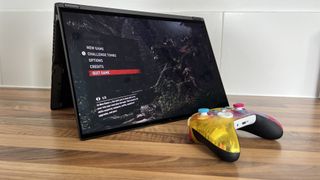
Asus ROG Flow X16 ports
The X16 packs a relatively restrained array of ports, but just enough for the accessories you need for gaming.
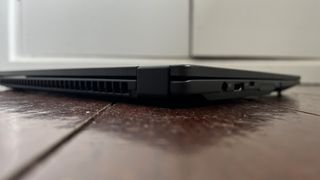
On the left, you’ll find the power jack, HDMI 2.0, a Thunderbolt 4 port, a proprietary jack for the XG Mobile GPU, and a 3.5mm headphone jack
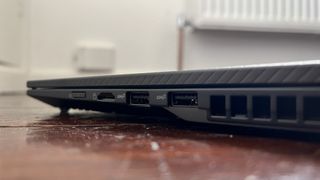
On the right, there are two USB-A ports, a microSD card slot and the power button. Like I said, it’s just enough, but I’d love to see an Ethernet jack and a USB-A port on the opposite side.
If you do need more though, check out our best laptop docking stations and best USB Type-C hubs pages.
Asus ROG Flow X16 display
Here it is. The bright, shining and colorful jewel in the Flow X16’s crown. You’re getting a 16-inch, mini-LED touchscreen display with a QHD resolution and 165Hz refresh rate, and put simply, it’s quite the looker.
In our testing, the Flow X16 blows past the premium gaming laptop average brightness with an impressive 447 nits, destroying the ROG Zephyrus G15 (325 nits), the TUF Gaming F15 (330 nits), the MSI Vector GP76 (316 nits) and even pips the Alienware m17 R5 to the post (436 nits).
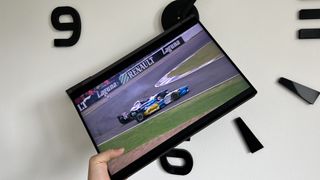
When put through the paces of our colorimeter, the X16 reproduced 82% of the DCI-P3 color gamut with a mighty impressive 0.22 Delta-E color accuracy score (closer to 0 is better). It should come as no surprise to say these results is down with the best of the competition (the Alienware hit a 0.2, the GP76 a 0.32 and the G15 achieved a 0.23), which all translates into a spectacular experience.
The vivid nature of the panel makes Forza Horizon 5’s latest Hot Wheels expansion explode in a flash flood of color, which flies by with buttery smooth motion at 200 mph. And on top of that, the mini-LED facilitates every terrifying dark scene of Alien Isolation with an immersive HDR quality that makes hiding from the xenomorph all the more spine-tingling.
And the accuracy of the display makes this a great workhorse, too, across any and all creative pro tasks, with the responsive touch interactions giving you direct interaction with your work. It’s a beauty, no matter what you throw at it, which you simply cannot take your eyes off of for one second.
Asus ROG Flow X16 keyboard and touchpad

The keyboard on the ROG Flow X16 is basically identical to what you’d find in the Zephyrus G15 — it’s a solid set of keys with a tactile feel, which welcomes your fingers with every tap, along with a soft touch plastic base that makes your wrists feel right at home.
I typed 83 words per minute on the 10FastFingers.com typing test, which trumps 80-wpm average. The quiet switches have that nice snap that you like to feel on a Chiclet-style keyboard and the RGB backlighting illuminates each key clearly for nighttime gameplay.

Going further south, the 5.1 x 3.3-inch touchpad feels generously massive in size, which makes for long, glorious gliding moves and graceful Windows 11 multi-touch gestures, followed up with a satisfyingly snappy click.
Asus ROG Flow X16 audio
The quad speakers on the ROG Flow X16 with Dolby Atmos provide impressive clarity with a decent amount of bass to boot. Not only that, but they can hold their own at high volumes too.
Four Year Strong’s “Get Out of My Head” blasted the speakers at full volume without a single hint of distortion, while preserving the details of the crunchy guitars and soaring vocals.

This translates well into gaming, too, with the Forza Horizon 5 cars, mixed with the drum and bass of Hospital radio, being nicely balanced at all volumes.
And while this is more about this is more about performance than audio, it’s worth noting that the fan sound is nowhere near as loud as I feared for a thinner system like this — never hitting volumes that you’d consider to be beyond disturbing.
Of course, for the best audio experience, check out our list of best gaming headsets.
Asus ROG Flow X16 gaming, graphics and VR
We got to test two different specs of the ROG Flow X16. The one we’ll use for lab-tested comparisons comes with an RTX 3060 GPU, which is paired with impressive internals (more on that in the next section), this is capable of handling many graphically intense titles.
Out the box on default settings, the X16 doesn’t quite match up to the likes of the Alienware m17 R5, the MSI Vector GP76 or even the cheaper TUF Gaming F15 — dropping behind the premium gaming laptop average across all of our benchmarks.
But these numbers don’t tell the full story, which is a simple one: this system keeps up just enough with higher settings and that convertible form factor makes this a really fun way to game on the go.
| Benchmark | Asus ROG Flow X16 (RTX 3060) | MSI Vector GP76 (RTX 3070 Ti)) | Alienware m17 R5 (AMD Radeon RX 6850M XT) | Asus ROG Zephyrus G15 (RTX 3070 Ti) |
| 3DMark Fire Strike | 17846 | 26787 | 28255 | 20867 |
| 3DMark Time Spy | 7648 | 12054 | 12089 | 8966 |
| 3DMark Fire Strike Ultra | 4858 | 7679 | 8156 | 6064 |
| 3DMark Port Royal | 4437 | 7212 | 5819 | 5623 |
| Grand Theft Auto V 1080p | 83.3 | 126.9 | 103.9 | 97.8 |
| Far Cry 6 1080p | 65 | 107 | 81 | 68 |
The top-of-the-line model we put through the wringer beefs up that GPU to an RTX 3070 Ti, which comes with a tasty increase in performance levels.
| Benchmark | RTX 3060 | RTX 3070 Ti |
| 3DMark Fire Strike | 17846 | 19421 |
| 3DMark Time Spy | 7648 | 8569 |
| 3DMark Fire Strike Ultra | 4858 | 5921 |
| 3DMark Port Royal | 4437 | 5876 |
| DiRT 5 1080p | 63.63 | 86.4 |
| DiRT 5 QHD | 49.13 | 69.2 |
| Shadow of The Tomb Raider 1080p | 73 | 101 |
| Shadow of The Tomb Raider QHD | 43 | 82 |
And of course, go beyond the out-of-the-box results and dip into the Armoury Crate app, and you can really start to maximize on thermal design power and total graphics power with Turbo Mode. Alongside this, you could go one step further and remove any CPU-based roadblocks with the MUX Switch.
These can contribute to a dramatic increase in frame rates and ray-tracing performance — not quite the 2x leap you’ll find in the TUF Gaming F15 when utilizing these settings, but certainly noticeable.
| Benchmark | Balanced | Turbo | MUX Switch |
| 3DMark Fire Strike Ultra | 5921 | 6801 | 6830 |
| 3DMark Port Royal | 5876 | 6422 | 6427 |
| DiRT 5 1080p | 86.4 | 104.1 | 105.6 |
| DiRT 5 QHD | 69.2 | 89.8 | 94.5 |
| Forza Horizon 5 Ultra 1080p | 82 | 89 | 92 |
| Forza Horizon 5 Ultra QHD | 71 | 75 | 81 |
| Shadow of The Tomb Raider 1080p | 101 | 130 | 144 |
| Shadow of The Tomb Raider QHD | 82 | 111 | 124 |
On paper, this isn’t the powerhouse serious gamers would expect to receive for the investment. For that purpose, there are a slew of options in our best gaming laptops list that will satisfy even the most stat-focused pro gamers.
Still, it plays every game you throw at it more than well enough, and ultra-beasty performance is not what the Flow X16 is trying to achieve, as you can clearly tell Asus has put its focus into the screen and form factor.
Plus, if you really want to up the horsepower, that’s what the XG Mobile GPU port is for, and you can find out about what that is capable of in our Asus ROG Flow X13 video review.
Asus ROG Flow X16 performance
Outside of the GPU differences, both of the X16s we tested come armed with an AMD Ryzen 9 6900HS CPU, 16GB of DDR5 RAM and a 1TB PCIe Gen 4 SSD.
On the Geekbench 5.4 overall performance test, the X16 produces an impressive Geekbench 5.4 score of 9,570, which doesn’t quite match up to the same processor in the ROG Zephyrus G15 (10,017) nor the bonkers Intel Core i9-12900HK in the Vector GP76 (12,234), but it does come close to the AMD Ryzen 9 6900XT in the Alienware m17 R5 (9,875).
This powerhouse transcoded a 4K video to 1080p in 5 minutes and 48 seconds on our HandBrake benchmark, which sped past the category average (6:38), fell behind the GP76 (4:40) and the m17 R5 (5:30), but beat the G15 (6:07).

On our file transfer test, the SSD is still one of Asus’ weaknesses, as the 1TB SSD hit a rate of 683.6 megabytes per second, which falters against the 1,334MBps category average and all of its competition. For context, the GP76’s 1TB SSD peaked at 719.9MBps, the m17 R5’s 2TB drive managed an astronomical 1,766.8MBps and the G15 defied the curse of the slow Asus 1TB SSD with 1,170.1MBps.
And the end result? File transfers are a slightly slower, but not annoyingly so, and while the numbers put this towards the back of the pack, Geekbench numbers this high still translate into a seriously speedy system.
Pair it with the DDR5 RAM and the X16 holds its own in all multitasking scenarios. I did everything I could — opened Forza Horizon 5 in the background, launched 20 Chrome tabs, including several videos, and did some Photoshop editing, but it still operated smoothly without a hitch.
Asus ROG Flow X16 battery life
Unlike many big screen convertibles, the Flow X16’s battery life is pretty good. In our testing, it managed to hit 7 hours and 5 minutes in our non-gaming Battery Informant testing — beating out the m17 R5 (6:07) and annihilating the Vector GP76 (2:45).
Of course, you can run this thing down fast while gaming, as is proven by the 1:04 PCMark 10 result, but the superpower of these AMD Ryzen 6000 CPUs is continuing to be its longevity.
Asus ROG Flow X16 webcam
The 720p webcam with IR for Windows Hello support is exactly what you’d expect. It’s a potato, but a useful potato nonetheless.

With a mushy quality that makes me look like even more of a melted ice cream than I do right now (thank you, heatwave), and an overwhelming fuzziness when placed under difficult lighting conditions, it’s not a pretty picture — literally. The convenience is there, but I recommend checking out our best webcams page for a camera you won’t be embarrassed to use for the likes of casual streaming.
Asus ROG Flow X16 heat
Inside, you’ll find a pretty comprehensive cooling system featuring five heatpipes, a pulsar heatsink, Asus’ patented Frost Force tri-fan thermal module, and liquid metal on the CPU.
But all of this can’t fully withstand the heat onslaught of packing so much tech into a thin base.
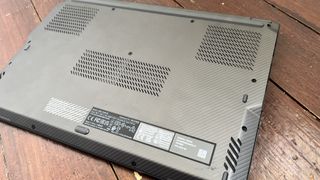
After gaming for 15 minutes, the underside clocked in at 116 degrees Fahrenheit, leaping over our 95-degree comfort threshold. The center of the keyboard and touchpad are also a little spicy, hitting 110 and 85 degrees, respectively.
The hottest spot can be found just above the F6 key — peaking at a spicy 126.5 degrees! Though, all this said, it does seem to run a tad cooler than the Alienware m17 R5 (touchpad at 95 degrees and the keyboard at 116 degrees) and MSI Vector GP76 (105 and 117 degrees).
Just make sure you don’t cover those vents!
Asus ROG Flow X16 software and warranty
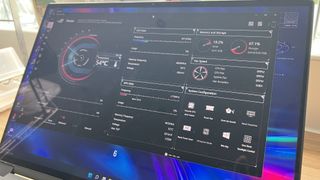
It’s business as usual for the X16. Much like all recent Asus gaming laptops, Armoury Crate is your go-to app for managing the performance of the CPU, GPU and fans. Here, you’ll also find options to customize key lighting and your display’s color/contrast profile, as well as an aggregated game launcher that pulls in all titles from all your online stores into one place.
To protect your purchase, the X16 comes with a one-year limited warranty. See how Asus performed on our Tech Support Showdown and Best and Worst Brands ranking.
Bottom Line

The Asus ROG Flow X16 is a spectacular big screen ultraportable — a convertible, adorned with a subtle aesthetic, paired with uncompromising power that refines how you play games on-the-go..
A mesmerizing screen, strong battery life and decent port selection complete the package, resulting in a system that is fantastic for both work and play.
But things do heat up fast under strenuous conditions, and all of this potential comes at a steep price when compared to other similarly specced laptops.
Trust me. If you can afford the luxury, you will not be disappointed.

Jason brought a decade of tech and gaming journalism experience to his role as a writer at Laptop Mag, and he is now the Managing Editor of Computing at Tom's Guide. He takes a particular interest in writing articles and creating videos about laptops, headphones and games. He has previously written for Kotaku, Stuff and BBC Science Focus. In his spare time, you'll find Jason looking for good dogs to pet or thinking about eating pizza if he isn't already.
